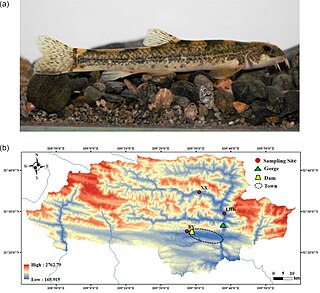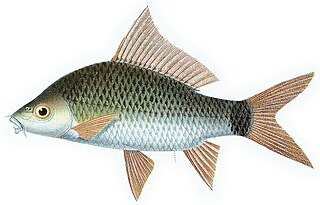
Pieter Bleeker was a Dutch medical doctor, ichthyologist, and herpetologist. He was famous for the Atlas Ichthyologique des Indes Orientales Néêrlandaises, his monumental work on the fishes of East Asia published between 1862 and 1877.

George Albert Boulenger was a Belgian-British zoologist who described and gave scientific names to over 2,000 new animal species, chiefly fish, reptiles, and amphibians. Boulenger was also an active botanist during the last 30 years of his life, especially in the study of roses.
Victor Gruschka Springer was an American biologist who was a Senior Scientist emeritus, Division of Fishes at the Smithsonian Institution's National Museum of Natural History in Washington, D.C. He was a specialist in the anatomy, classification, and distribution of fishes, with a special interest in tropical marine shorefishes. He published numerous scientific studies on these subjects; also, a popular book called "Sharks in Question, the Smithsonian Answer Book" 1989.

Ebosia is a genus of marine ray-finned fishes belonging to the family Scorpaenidae, the scorpionfishes. They are known as falcate lionfishes. They are native to the Indian and Pacific Oceans.
George Sprague Myers was an American ichthyologist who spent most of his career at Stanford University. He served as the editor of Stanford Ichthyological Bulletin as well as president of the American Society of Ichthyologists and Herpetologists. Myers was also head of the Division of Fishes at the United States National Museum, and held a position as an ichthyologist for the United States Fish and Wildlife Service. He was also an advisor in fisheries and ichthyology to the Brazilian Government.
Maurice Kottelat is a Swiss ichthyologist specializing in Eurasian freshwater fishes.

Triplophysa bleekeri is a species of stone loach in the genus Triplophysa. It is endemic to China. It grows to 8.2 cm (3.2 in) TL. Having a wide distribution across the Qinghai-Tibet Plateau, it lives in fast-flowing rivers from 200 to 3,000m in altitude. Being an unusual species inhabiting high-altitude regions, it is an excellent model to investigate the genetic mechanisms of adaptation to the local environment. With this in mind a chromosomal-scale genome assembly was sequenced and assembled with a genome size of ~628 Mb. This data finding that the Triplophysa genus likely diverged when the Qinghai-Tibet Plateau elevated by >4,000 m roughly 40 million years ago.

Paraplesiops bleekeri, commonly known as the eastern blue devil, blue-tipped long-fin or Bleeker's blue devil fish, is a species of fish in the family Plesiopidae. This colourful, secretive fish is endemic to Australia, where it is a protected species.
Gerald Robert "Gerry" Allen is an American-born Australian ichthyologist. His career began in 1963, when he spent a semester at the University of Hawaii, where he also received a PhD in marine zoology in 1971. In 1972, Allen wrote his doctoral thesis on the systematics and biology of the anemone fish.

Chlorurus bleekeri, known commonly as Bleeker's parrotfish, is a species of marine fish in the family Scaridae.
Osteochilus lini is a freshwater fish from Southeast Asia. It is found in the lower Mekong River basin, the Chao Phraya River basin, and some coastal drainages; it occurs in Laos, Vietnam, Cambodia, and Thailand. Its common name is dusky face carp.

Osteochilus waandersii is a cyprinid freshwater fish from Southeast Asia. It is found in Indochina as well as in Sumatra and Borneo. Its common name is Waanders's hard-lipped barb.
Dotsugobius bleekeri, also known as the dark mangrovegoby, is a species of fish in the family Gobiidae known from brackish estuarine and the adjacent freshwater areas of the eastern Indian Ocean, Andaman Sea and Western Pacific.
Canna Maria Louise Popta was a Dutch biologist.
Osteochilus chini is a species of cyprinid fish in the Labeoninae endemic to Sabah.
Osteochilus harrisoni is a species of cyprinid fish endemic to northern Borneo.
Osteochilus ingeri is a species of cyprinid fish endemic to Sabah.

Osteochilus kahajanensis is a species of cyprinid fish endemic to the southern tip of the Malay Peninsula.

Osteochilus kappenii is a species of cyprinid fish endemic to the Kapuas, western Borneo.








